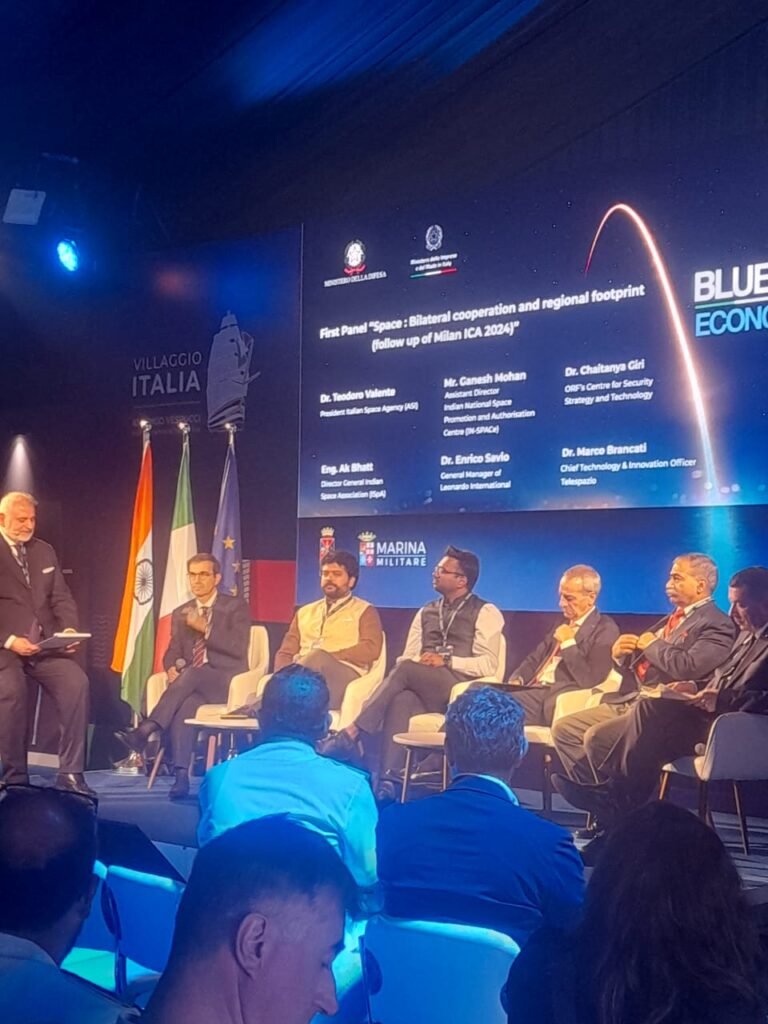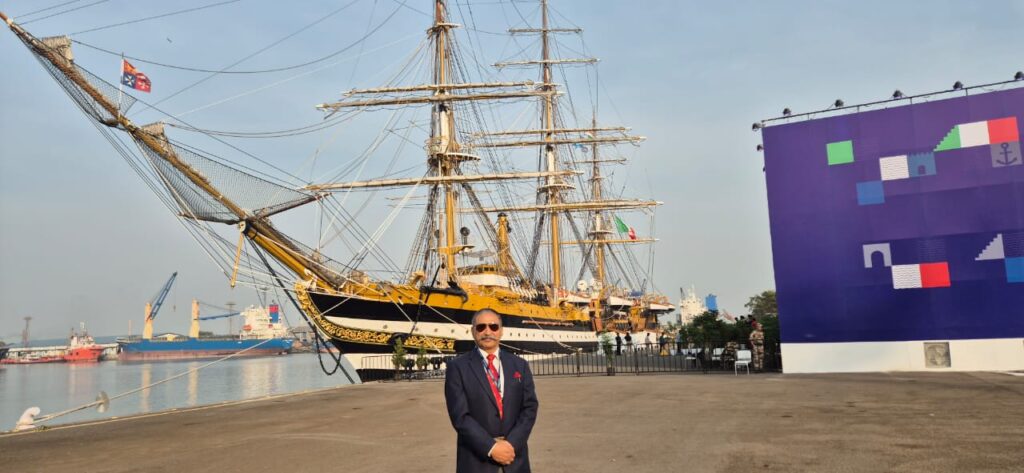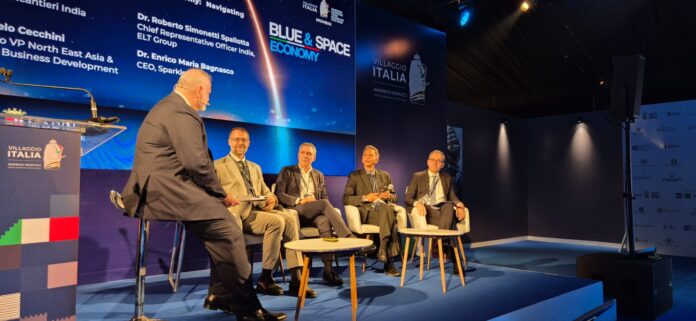By Lt Gen AK Bhatt (r)

As space becomes the next great frontier for technological innovation and strategic partnerships, the collaboration between India and Italy in the space domain stands out as a quietly evolving success story. Bridging decades of scientific exchanges, institutional linkages, and private sector dialogue, this relationship is entering a new phase, driven by shared interests in sustainability, advanced materials, human spaceflight, and commercial space ventures.
As a space industry body with deep involvement in global aerospace evolution, we’ve had the privilege of witnessing partnerships rise, missions transform into milestones, and scientific curiosity drive engineering marvels. The growing collaboration between India and Italy in the space sector is profound, full of potential, and grounded in mutual trust.
What began as academic exchanges decades ago has evolved into a well-rounded strategic partnership that spans science, industry, diplomacy, and the commercial frontier of space.
Italy’s Independent Space Capacity: A Deep-Rooted Legacy
Italy’s space journey dates back to the early 1960s. It was the third country in the world, after the USSR and the United States, to launch its satellite, San Marco 1, on December 15, 1964, in collaboration with NASA. Since then, Italy has established itself as one of Europe’s leading space nations, with a well-integrated public-private ecosystem. Today, the Italian Space Agency (ASI) serves as the nodal agency for national programmes, coordinating with entities like Thales Alenia Space, Avio, and Leonardo.
Key capabilities include:
- Satellite manufacturing and small launcher development (Vega rocket by AVIO)
- Participation in Earth observation, telecommunications, and navigation systems
- International Space Station (ISS) Contributions: Over 40% of the habitable volume of the ISS was manufactured in Italy, showcasing its expertise in human spaceflight infrastructure.
- Long-term investments in space science, robotic exploration, and human spaceflight
Italy and the European Space Agency (ESA)
Italy stands out as one of Europe’s few nations with comprehensive space capabilities, spanning satellite manufacturing, launch services, and deep-space science. Its space agency, ASI, manages key programs including Earth observation and planetary exploration. Notably, Italy played a pivotal role in designing International Space Station (ISS) modules and leads Europe in space food research and development, as well as microgravity research.
As a founding member and the third-largest contributor to ESA, Italy has played an instrumental role in primary European missions, including Copernicus (Earth Observation), Galileo (Navigation), ExoMars (Mars Exploration), Ariane, and Vega (Launch Vehicle Programs). Italian industry, through joint ventures such as Thales Alenia Space (owned by Thales & Leonardo), makes significant contributions to ESA and influences its governance. This dual role solidifies Italy’s position as both an independent force and a core player in Europe’s space future.
India-Italy Space Cooperation: From Institutions to Industry
The Quiet Roots of a Now-Vital Collaboration –The seeds of India-Italy Space cooperation were sown not in boardrooms, but in laboratories and universities. As early as the 1970s and 1980s, Italian scientists collaborated with Indian institutions on atmospheric science and satellite remote sensing. Even before India launched its first satellite, Italian academia and research centers, some of which had pioneered Europe’s early space experiments, such as the San Marco platform, had been exchanging knowledge with their Indian counterparts. These exchanges laid a cultural and scientific foundation that many often overlook.
One lesser-known fact: Italy was the first country to offer India launch infrastructure support through the San Marco Equatorial Range off the coast of Kenya (also known as the Luigi Broglio Space Center). Between 1967 and 1988, several Indian sounding rockets and satellites were supported through this Italian-built facility, making Italy not just an early partner but a true enabler of India’s first steps into space.
From Institutions to Industry
Formal institutional cooperation between the Indian Space Research Organisation (ISRO) and the Italian Space Agency (ASI) began in 1998 with the signing of the first Memorandum of Understanding. The partnership gained strength in 2007 with an agreement covering: Earth observation, Telecommunication satellites, Space science and exploration, and Disaster management support.

Key Historical Milestones:
| Year | Event | Details |
| 2007 | Framework MoU signed between ISRO and ASI. | Noted in the 2007 International Astronautical Congress, renewed cooperation, including Italy as part of ESA. |
| 2011 | ASI-ISRO Earth Observation workshops | Data exchange with ESA and its member states, building on earlier ESA-India agreements |
| 2019 | Bilateral discussions on satellite technology collaboration | Broader ESA-related discussions; India hosted a symposium on human spaceflight |
| 2021-2024 | Renewed industry-to-industry engagement | Commercial and academic events reflect deepening India-Italy interactions |
Italy and India have also collaborated in the Sentinel data-sharing framework under the Copernicus programme, which provides ISRO access to advanced European EO data.
Highlights of India-Italy Bilateral Space Agreements
Below is a summary of key agreements framing the India-Italy space collaboration:
| Year(s) | Event / Interaction |
| 1967-1988 | Use of the San Marco Equatorial Range off Kenya by Italy to launch sounding rockets and satellites for Italian and Indian scientists (Italy’s San Marco programme) |
| 2019 | Scientific payload collaboration: Italy contributed a laser retroreflector (via NASA) to India’s Chandrayaan‑2 mission for lunar distance measurements |
| 2024 (for 2025‑29) | The India-Italy Joint Strategic Action Plan, unveiled during the G20 in November 2024, includes a chapter on expanding cooperation in Earth observation, Heliophysics, and Lunar exploration (space sector focus) |
| 2025-2027 | The Executive Programme of Cooperation (EPOC) for 2025-27 has been confirmed to fund joint research in areas such as space technology, AI, robotics, start-ups, and incubation, as part of the bilateral science & innovation strategy. |
These interactions reflect a blend of heritage science and forward-looking mission goals, and are expected to expand as commercial collaborations take center stage.
From Formal Frameworks to Real-Time Projects
At the G20 Summit in November 2024, the signing of the India-Italy Joint Strategic Action Plan (2025-2029) marked a new phase. This wasn’t a symbolic agreement; it was a pragmatic roadmap aimed at linking research, industry, and application. It commits both nations to explore joint efforts in Earth observation, heliophysics, and lunar science. And crucially, it sets timelines and accountability measures for actual delivery.
In parallel, the Executive Programme of Cooperation (EPOC) 2025-2027, renewed in April 2025, reinforced collaborative opportunities in deep tech, including space medicine, AI for mission control, and even interplanetary robotics. This dual-layered structure, combining diplomatic and technical elements, is what gives this partnership its legs.
ISpA’s Role: Catalyzing Commercial Space Diplomacy and Strengthening Industry Collaboration
The Indian Space Association (ISpA) has emerged as a key facilitator of dialogue between Indian and international commercial space entities. Through curated discussions and bilateral exchanges, ISpA remains committed to building a bridge between India’s commercial space ecosystem and forward-looking partners, such as Italy.
ISpA has actively engaged in several key events to foster collaboration with Italy. On 30th November, 2024, Blue and Space Economy” seminar was held at Mumbai along with the visit of the Italian ship AMERIGO VESPUCCI, Prof. Teodoro Valente, President of the ASI and DG ISpA, Lt Gen AK Bhatt (Retd) shared the platform of the panellists and highlighted sustainable growth and dual-use innovations in maritime and space sectors.
ISpA also served as a Supporting Partner for the Embassy of Italy’s “Living in Space: Exploring Innovative Solutions to Tackle New Challenges” event in New Delhi on December 16, 2024. This seminar delved into low-gravity health impacts, space nutrition, and microbial threats, with the DG ISpA emphasizing commercial innovation and Indo-Italian cooperation. ISpA was a key speaker at the “Cutting-edge Technologies” roundtable at the Italy-India Business, Science, and Technology Forum, held on April 10-11, 2025, in New Delhi. Organized by the Italian Ministry of Foreign Affairs and other prominent Italian entities, this significant event also saw ISpA facilitate crucial B2B meetings between Italian and Indian Space companies. Reflecting Italy’s strategic commitment to India’s defence and space-tech future, senior executives from Leonardo, Sandro Panagini (VP Strategy) and Gianluca Baldassarre (SVP Marketing and Strategy), attended and engaged with Indian industry stakeholders at the DefSpace Symposium 2025

India-Italy Private Sector Collaboration: Building Blocks for a Commercial Orbit
As India liberalizes its space sector and opens doors to private investment, a sharp uptick in Italian space firms exploring the Indian market has been observed over the past two years. Italian companies are actively seeking partnerships with Indian firms in areas such as satellite components and subsystems, space-based services, ground station technologies, and AI applications in Earth observation. These companies now regularly feature in Indian aerospace expos, tech incubators, and procurement forums. A key example of this new axis of commercial collaboration is the contract between Thales Alenia Space and NIBE Space for the supply of a high-resolution optical Earth observation satellite.
Further reinforcing Indo-Italian partnerships in operational satellite services, Pixxel, India’s flagship hyperspectral imaging startup, has signed an agreement with Leaf Space, Italy’s leading satellite services provider, to provide ground segment support for its upcoming constellation. This includes real-time satellite telemetry, tracking, and control (TT&C) services via Leaf Space’s global network.
Additionally, in July 2025, Dhruva Space formalized an agreement to supply its Solis+ space-grade solar panels to Pixxel’s satellite fleet. While this particular deal is an intra-India collaboration, it underscores a growing modular and mission-focused approach that is catching the attention of European collaborators, including those from Italy. These synergies position Indian firms as agile, technically proficient partners for future multi-national constellations and deep-space missions.
While Argotec (known for its modular satellite platforms, such as Hawk Plus) and SITAEL (specializing in advanced propulsion systems) have not yet formalized direct joint missions with Indian firms, ongoing dialogue around small satellite buses, space nutrition R&D, and electric propulsion technologies suggests strong potential convergence areas. Indian startups have also expressed interest in exploring AI-enabled satellite systems and dual-utility platforms for space-based applications in Earth observation, agri-tech, and disaster response.
These interactions, though early-stage in some cases, clearly mark a shift in the India-Italy cooperation matrix, moving from primarily inter-governmental coordination to dynamic business-to-business engagement. Let’s not forget the vibrant role played by the Italian Embassy and ASI in public diplomacy. Through curated events like Italian Space Day and exhibitions such as “From the Moon to Mars ” in Bengaluru (December 2024 – January 2025) and “Living in Space ” in Delhi (December 2024), Italian space history has been brought to life for Indian audiences.
What the Future Might Hold: A New Chapter of Strategic Growth
There’s a growing belief, one we share, that the next wave of global space exploration will be multipolar, modular, and mission-focused. In that context, the India-Italy axis offers some compelling prospects:
- Joint Lunar Payloads: With India focusing on the Moon post-Chandrayaan-3 and ASI contributing to NASA’s Artemis, there’s real potential for dual-branded science payloads or orbital infrastructure.
- Constellation Projects: Italy’s experience with radar satellites (COSMO-SkyMed) and India’s vision for national and regional constellations create natural grounds for co-development, especially in disaster management and precision agriculture.
- Crewed Spaceflight Support: As India prepares for Gaganyaan, Italy, having built modules for the ISS, can offer guidance on habitability systems, life sciences, and space food tech. Argotec, for instance, is known for its space nutrition R&D, a niche area in which few excel.
- Space Economy Scale-up & Startups Collaboration: Indian startups are increasingly looking outward. Tapping into Italy’s design precision and Europe’s regulatory framework could give Indian players a leg up in the global market. India’s space ecosystem is emerging rapidly; the India-Italy Strategic Action Plan for 2025-29 includes provisions to support partnerships involving MSMEs, start-ups, and data sharing.
- Education and Talent Exchange: There’s already movement here, with Indo-Italian fellowships being shaped to place students in payload labs, mission control centers, and even analog astronaut training programs in Sardinia and the Himalayas. The Action Plan also emphasizes collaboration in education, fellowships, and research mobility programs. It notes planned initiatives like an Indo-Italian Innovation and Incubation Exchange Programme focused on STEM innovation, mutual R&D labs, and talent exchange, likely including payload training and mission control exposure.
Conclusion: From Parallel Orbits to a Shared Horizon
India and Italy may have started their journeys in different trajectories, but both now recognise space not just as a tool of science, but as a driver of commercial diplomacy, national resilience, and global innovation. With strong institutional frameworks, rising industry ties, and a shared vision for responsible exploration, this partnership is poised to scale new frontiers.
ISpA, as the representative of the Indian Space Industry, will continue championing global cooperation, with the India-Italy partnership standing out for its sincerity, ambition, and grounded execution.
From our vantage point in the global space industry, what stands out about the India-Italy partnership is its groundedness. It’s not flashy, not overly hyped, but it’s incredibly sincere. Both countries have long traditions of punching above their weight in space science and innovation. And now, they’re doing it together. This is not just about launching rockets or signing MoUs. It’s about co-creating missions, solving global problems through data and technology, and giving the next generation of scientists and engineers a shared launchpad.
In a decade that will likely define the next century of space exploration, the India-Italy alliance is one to watch, not just because of where it’s been, but because of where it’s clearly going.
Lt Gen AK Bhatt PVSM UYSM AVSM SM VSM (r), Founding Director General of the Indian Space Association and Chairman of IIIT Kota and Ranchi, is a distinguished former Indian Army officer with over 39 years of service, including as Director General Military Operations and Chinar Corps Commander. Recognized for his leadership and strategic expertise, he now champions the growth of India’s private space sector.


